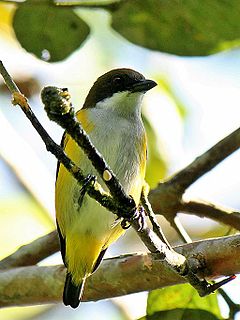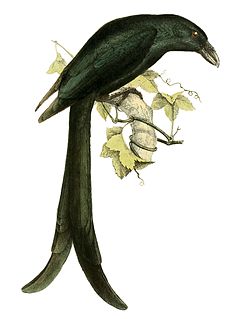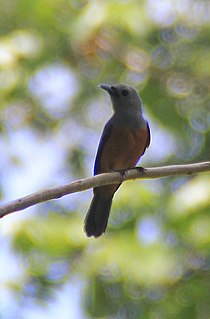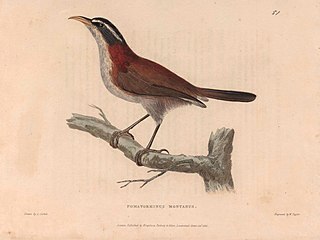
The Sula megapode or Sula scrubfowl is a species of bird in the family Megapodiidae. It is found only in the Banggai and Sula Islands between Sulawesi and the Maluku Islands in Indonesia, where its habitats are subtropical or tropical dry forest, subtropical or tropical moist lowland forest, subtropical or tropical mangrove forest, and subtropical or tropical moist shrubland. It is threatened by habitat destruction.

The blue-faced rail or bald-faced rail, is a species of bird in the family Rallidae. It is endemic to northern Sulawesi, Indonesia.

The Sulawesi blue flycatcher is a species of bird in the family Muscicapidae. It is endemic to Indonesia. Its natural habitats are subtropical or tropical moist lowland forests and subtropical or tropical moist montane forests.

The yellow-sided flowerpecker is a species of bird in the family Dicaeidae. It is endemic to Sulawesi and adjacent islands in Indonesia.

The crimson-crowned flowerpecker is a species of bird in the family Dicaeidae. It is endemic to the island of Sulawesi in Indonesia. Its natural habitats are subtropical or tropical moist lowland forest and subtropical or tropical moist montane forest.

The Andaman drongo is a species of bird in the family Dicruridae. The species is endemic to the Andaman Islands of the Indian Ocean. There are two subspecies, the nominate race being found across the main islands of the archipelago, and the race dicruriformis occurring on Great Coco Island and Table Island in the north of the chain.

The crow-billed drongo is a species of bird in the family Dicruridae. It is native to moist tropical forests of southeastern Asia where its range extends from India to the Philippines and Indonesia. It is a completely black bird with a shallowly forked tail and is similar in appearance to the black drongo. It breeds between April and June, the cup-shaped nest being built in the fork of a branch by both birds, the female afterwards incubating the eggs. It is a common bird and the IUCN has listed it as "least concern".

The shining drongo is a species of bird in the family Dicruridae. It is found in Cameroon, Central African Republic, Republic of the Congo, Democratic Republic of the Congo, Ivory Coast, Equatorial Guinea, Gabon, Ghana, Guinea, Liberia, Nigeria, Sierra Leone, and Togo. Its natural habitat is subtropical or tropical moist lowland forests.

The Wallacean drongo or Greater Wallacean drongo is a species of bird in the family Dicruridae. It can be found in the countries of Indonesia and East Timor. It was formerly considered to be conspecific with the hair-crested drongo.
The Grand Comoro drongo is a species of bird in the family Dicruridae. It is endemic to Comoros.

The Sumatran drongo is a passerine bird in the family Dicruridae. It was formerly considered conspecific with the hair-crested drongo. It is endemic to the island of Sumatra in Indonesia. Its natural habitat is subtropical or tropical moist lowland forests. It is threatened by habitat loss.

The Mayotte drongo is a species of bird in the family Dicruridae. It is endemic to Mayotte.

The forest honeyeater is a species of bird in the family Meliphagidae. It is found throughout New Guinea. Its natural habitats are subtropical or tropical moist lowland forest and subtropical or tropical moist montane forest.

The island monarch is a species of bird in the family Monarchidae. It is found from Sulawesi to the Solomon Islands. Its natural habitats are subtropical or tropical moist lowland forests and subtropical or tropical moist montane forests.

The Sulawesi myzomela is a species of bird in the family Meliphagidae. It is endemic to Indonesia where it occurs in Sulawesi, Taliabu, Selayar and Tanah Jampea. Its natural habitats are subtropical or tropical moist lowland forests, subtropical or tropical mangrove forests, and subtropical or tropical moist montane forests.

The mountain peltops is a species of bird in the family Cracticidae. It is found in Indonesia and Papua New Guinea. Its natural habitats are subtropical or tropical moist lowland forests and subtropical or tropical moist montane forests.

The Javan scimitar babbler is a species of bird in the family Timaliidae. It is endemic to Java, Indonesia. The Sunda scimitar babbler, which is found in Sumatra, Borneo, and Malaysia, was formerly considered conspecific, with both species being grouped as the chestnut-backed scimitar babbler. Its natural habitats are subtropical or tropical moist lowland forest and subtropical or tropical moist montane forest.

The streak-breasted fantail is a species of bird in the family Rhipiduridae. It is endemic to Indonesia, where it occurs in Seram Island. Its natural habitats are subtropical or tropical moist lowland forests and subtropical or tropical moist montane forests.

The Sulawesi fantail is a species of bird in the family Rhipiduridae. It is endemic to Sulawesi in Indonesia. Its natural habitats are subtropical or tropical moist lowland forests and subtropical or tropical moist montane forests

The Sulawesi pygmy woodpecker, also known as the Sulawesi woodpecker, is a species of bird in the family Picidae. It is endemic to Sulawesi in Indonesia. Its natural habitats are subtropical or tropical moist lowland forest and subtropical or tropical moist mountains. Some taxonomic authorities continue to place this species in the genus Dendrocopos or Picoides.




















